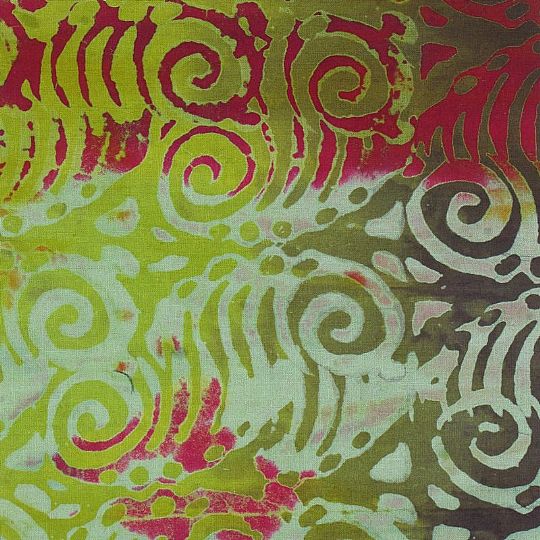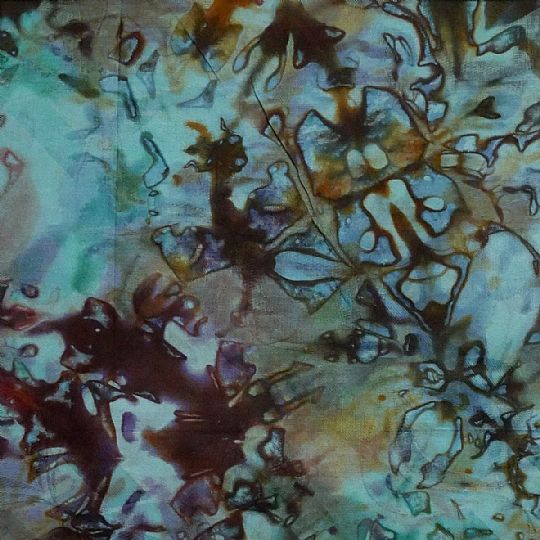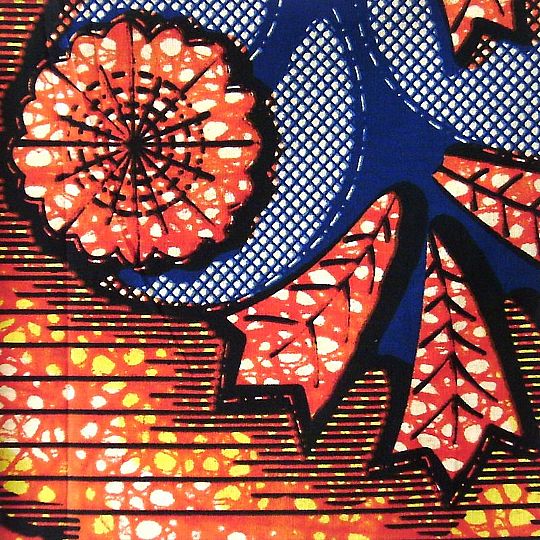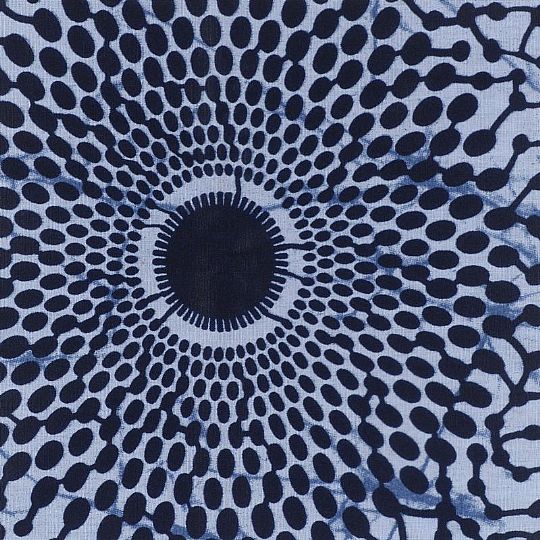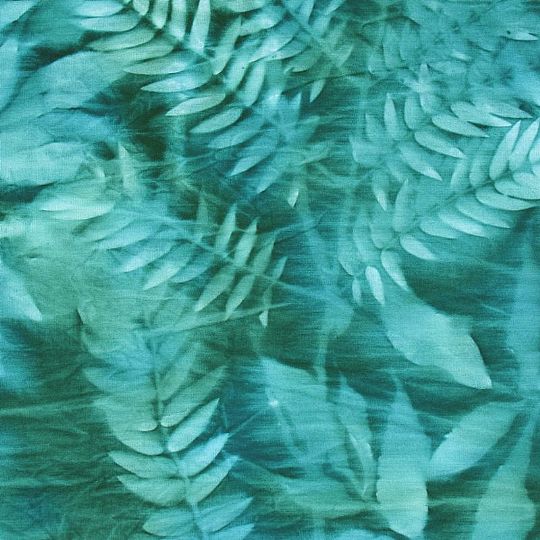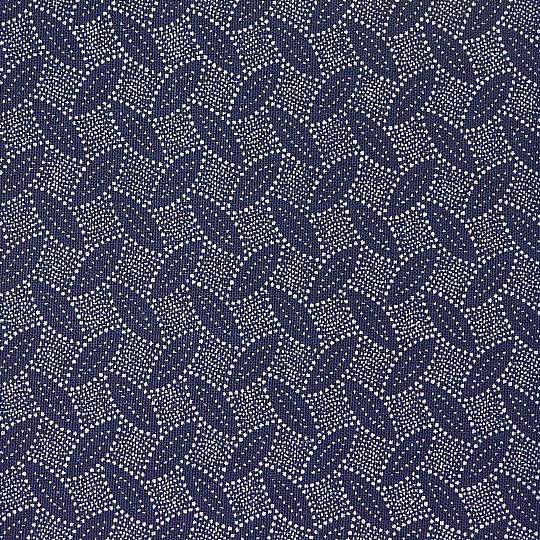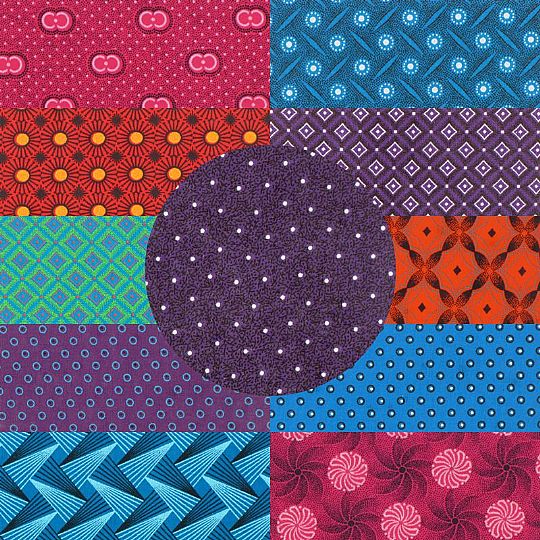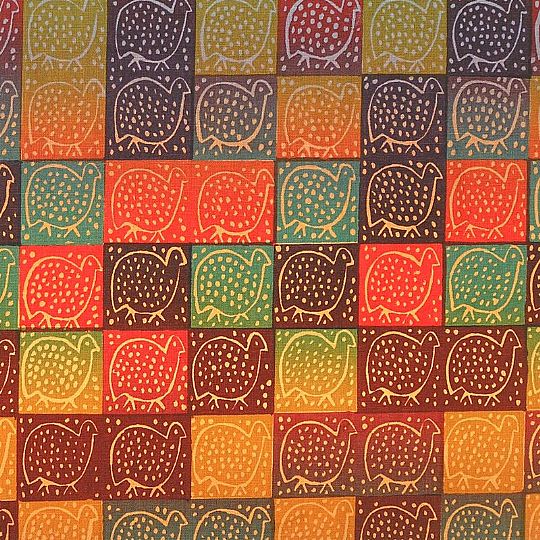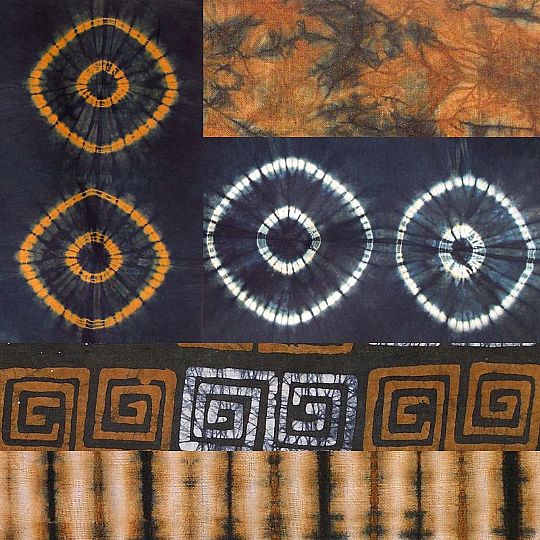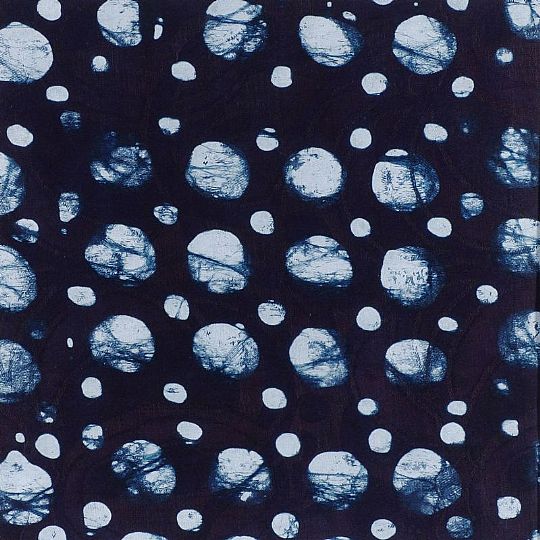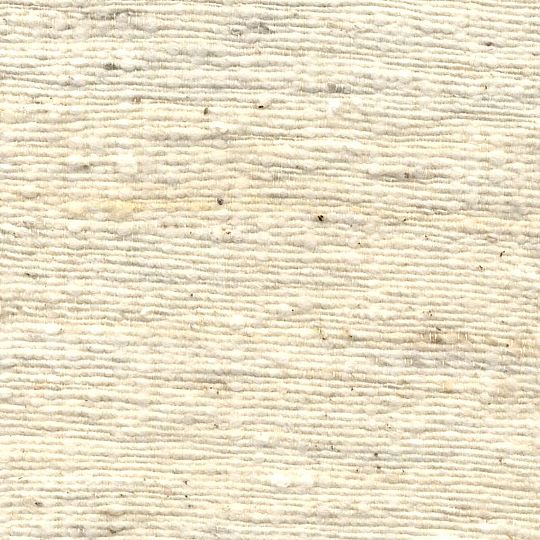African fabrics by the metre, half metre and fat quarter
Our variety and selection of African fabrics is constantly changing. We're always on the lookout for something new, different and exciting.
What we have in stock and what you'll find here on the website depends on where we've been on our recent travels, the markets we've discovered and the makers and traders that we've met along the way.
All of our African fabrics have been produced in Africa: either by artisan weavers, dyers and makers or - in the case of African wax print and Shwe Shwe - in African factories.
Our minimum order is a Fat Quarter.
Or you can buy a half metre, a metre or more, depending on stock available.
The unit for ordering fabrics is a Fat Quarter. What's a Fat Quarter?
A Fat Quarter is a term of measurement
The term Fat Quarter - abbreviated as FQ, is commonly used in patchwork and quilting.
A FQ is a ½ metre of fabric, cut in half across the width. By cutting across the width (as opposed to the length), the result is a squarish piece of fabric about 50 x 55 cm, depending on the width of the fabric.
How to order
Enter the number of Fat Quarters you would like into the quantity box. The website will automatically show the equivalent in metres. Your fabric will be sent as a single piece.
- For 1 fat quarter, enter 1
- for ½ metre, enter 2
- for ¾ metre, enter 3
- for 1 metre, enter 4
- for 1½ metres, enter 6
- for 2 metres, enter 8
- and so on...
Important: About Metric Measurement
All fabrics on The African Fabric Shop website are measured using the Metric system - metres and centimetres. All pre-cut pieces (Fat Quarters, Half Metres and Adventure Packs) are cut to metric measurements.
For customers who think in yards instead of metres: A metre is slightly longer than a yard - about 39 inches. If you require dressmaking lengths in yards and are not sure about the metric equivalent, there are numerous conversion sites on the Internet. Alternatively, email us with your requirement in yards and we will convert it to the nearest metric equivalent.
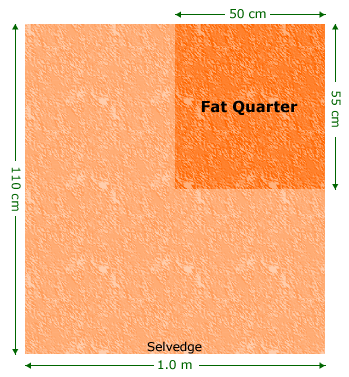
Exact dimensions of a Fat Quarter depend on the width of the fabric
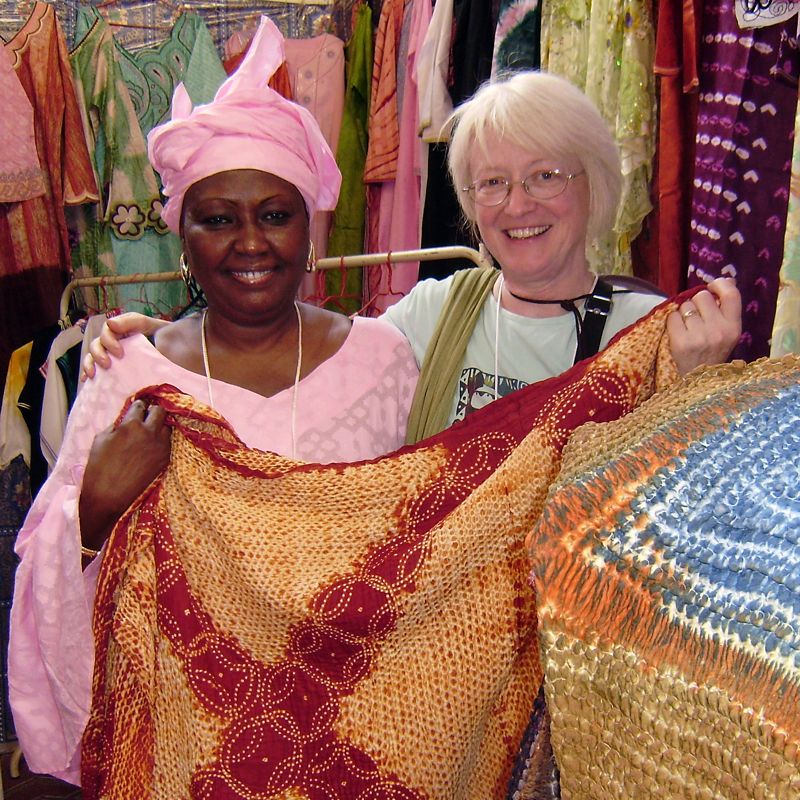 Magie Relph's textile adventures: sourcing Mauritanian malafa cloth at SIAO in Ouagadougou, Burkina Faso
Magie Relph's textile adventures: sourcing Mauritanian malafa cloth at SIAO in Ouagadougou, Burkina FasoSpecial Collection African Fabrics
These specially selected lengths of African fabrics are perfect for dressmaking and fashion applications.
- Lengths from 2 to 5 metres
- All fabrics 100% cotton, some on subtly woven damask
- Some are handpainted with up to five layers of wax, one for each subtle variation in colour, before dyeing and over dyeing in a progression of dye vats.
Hand-dyed African Batiks
Most of our hand-dyed batiks come from Ghana and The Gambia. Over the years we've developed wonderful friendships with many talented local dyers and batik artists.
We try to identify each fabric with the maker's name and many of our customers come back looking for fabrics by specific dyers.
All fabrics are 100% cotton. Some are a subtly woven damask; others are plain-weave cotton.
Hand-dyed African Tie-dye
Most of our hand-dyed tie-dye comes from The Gambia. We've developed wonderful friendships with many talented local dyers and try to identify each fabric with the maker's name. Many of our customers come back looking for fabrics by specific dyers.
All fabrics are 100% cotton. Most are a subtly woven damask; others are plain-weave cotton.
African Wax Prints
When most people think of African fabrics, the first thing that comes to mind is these traditional African wax prints.
Our African wax prints are made in Ghana: either by Ghana Textile Producers - GTP, or by Akosombo Textiles Limited - ATL.
All fabrics are 100% cotton.
African Wax Print Indigos
Traditional African wax print fabrics dyed in indigo only.
Our African wax prints are made in Ghana: either by Ghana Textile Producers - GTP, or by Akosombo Textiles Limited - ATL.
All fabrics are 100% cotton.
Langa Lapu South African Sun Prints
Designer Pru Bolus and her team combine leaves, ferns and seed pods from indigenous South African plants with eco-friendly dyes, expose the fabrics to the sun and presto: Langa Lapu fabrics!
Every single piece of Langa Lapu fabric is a unique, one-off creation, which is what makes these fabrics so very special.
All fabrics are 100% South African export quality cotton.
Shwe Shwe Indigos
The African Fabric Shop is the biggest importer - with the biggest choice - of Shwe Shwe fabric in the UK and Europe.
These fabrics are sometimes called 'Three Cats' - a reference to the distinctive logo stamped on the back of the fabric.
Originally, Shwe Shwe was produced in Manchester for export to South Africa. Today, it's made in South Africa by Da Gama Textiles.
All fabrics are 100% cotton.
Shwe Shwe Colours
Perfect for patchwork!
These great new colourways add a whole new spectrum of possibilities to traditional Shwe Shwe fabrics from South Africa.
Look for the genuine 'Three Cats' logo on the back - just like the original Shwe Shwe fabrics that were born in Manchester but are now 100% South African. The colour label for each fabric - i.e. purple, turquoise, etc. - refers to the base colour of the fabric before printing.
The African Fabric Shop is the biggest importer - with the biggest choice - of Shwe Shwe fabric in the UK and Europe.
Kudhinda Zimbabwe Screen Prints
Kudhinda fabrics are designed by Ros Byrne and handscreened by her expert team of printers in her Harare studio.
Kudhinda fabrics reflect the strength, colour and pattern of southern African design. Kudhinda is committed to fair trade principles.
All fabrics are 100% sheeting weight cotton, slightly heavier than dressmaking weight.
Kola & Indigo Hand-dyes
These traditional fabrics are all created by our friend Musa Jaiteh in his family compound in Sukuta.
Musa uses stitching, tieing and wax stamping to create a resist before hand-dyeing in kola nut and indigo.
All fabrics are 100% cotton, either damask or plain weave.
Indigo Hand-dyes
These traditional fabrics are all created by our friend Musa Jaiteh in his family compound in Sukuta.
Musa uses stitching, tieing and wax stamping to create a resist before hand-dyeing in indigo.
All fabrics are 100% cotton, either damask or plain weave.
Handwoven Strip Cloth
Weaving cotton into long, narrow strips up to 60 metres long is an important textile tradition found throughout West Africa. These strips are thicker than machine woven craft cotton.
In Africa, lengths of strip cloth are sewn together edge to edge to create either a whole cloth or a smock style garment.
We source our strip cloth in Ghana, Burkina Faso and The Gambia.
All strips are either 100% cotton or ultrasoft tree cotton - sometimes called 'silk cotton' - which feels similar to kapok. Undyed and unbleached, or indigo dyed.
- Fabrics & Textiles
- African Fabrics by the metre
- Special Collection African Fabrics
- Hand-dyed African Batiks
- Hand-dyed African Tie-dye
- African Wax Prints
- African Wax Print Indigos
- Langa Lapu South African Sun Prints
- Shwe Shwe Indigos
- Shwe Shwe Colours
- Kudhinda Zimbabwe Screen Prints
- Kola & Indigo Hand-dyes
- Indigo Hand-dyes
- Handwoven Strip Cloth
- Unique & Decorative African Textiles
- Mud Cloth / Bogolan
- Vintage & Collectable African Textiles
- Kuba Cloth
- Korhogo Cloths
- Indigo Cloths
- Undyed African Textiles
- Kenyan Kikoy
- Bark Cloth

